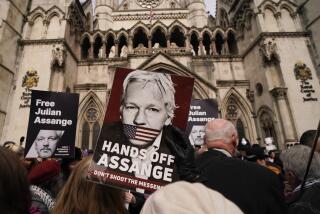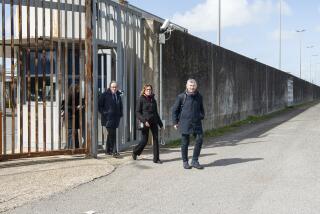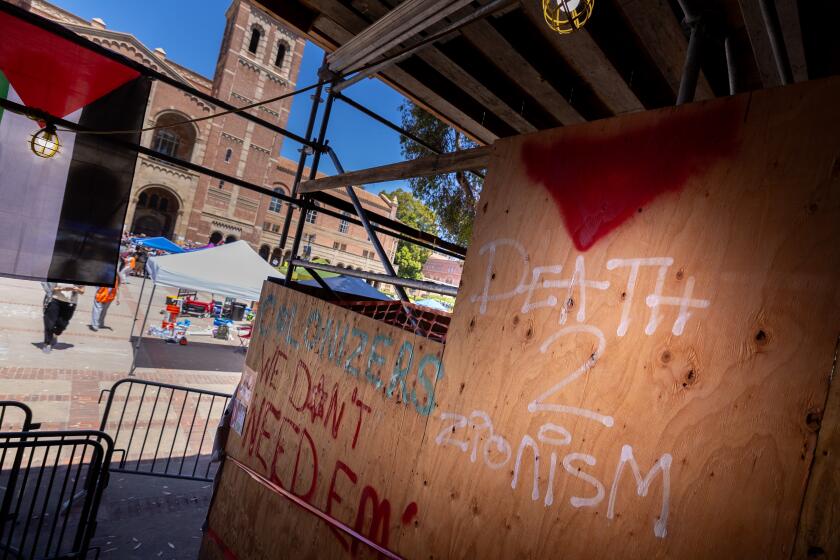Judge in Italy convicts 23 Americans in 2003 CIA kidnapping of Egyptian cleric
An Italian judge on Wednesday convicted 23 Americans of kidnapping an Egyptian cleric off the streets of Milan in 2003, a sweeping verdict against one of the CIA’s most valued anti-terrorism tools -- the practice known as extraordinary rendition.
The decision was a victory for Italian anti-terrorism prosecutors and police who spent six years building a massive case. The two-year trial exposed details of a secretive world and was the first anywhere to challenge the program under which the CIA abducted suspects and spirited them to other countries for interrogation.
A clandestine team of U.S. and Italian operatives abducted Hassan Osama Nasr, also known as Abu Omar, a Muslim cleric suspected of recruiting militants to fight in Iraq or Afghanistan. He was flown to Egypt, where he claims to have undergone months of torture and abuse.
The case sparked an international uproar, and the governments of Italian Prime Minister Silvio Berlusconi and his predecessor tried repeatedly to scuttle the trial.
“I think it is very important for everyone that this trial was completed,” said Armando Spataro, the lead prosecutor, adding: “The message of this important ruling -- to nations, governments, institutions, secret services, etc. -- is that we cannot use illegal instruments in our effort against terrorism. Our democracies, otherwise, would betray their principles.”
Judge Oscar Magi acquitted three other Americans, including the former CIA station chief in Italy, because they had diplomatic immunity. Magi also set aside charges against five Italian intelligence officials, including the former chief and deputy chief of Italy’s spy agency, ruling they were protected by a state secrets law. But he convicted two other Italians.
The Americans were tried in absentia. Given that the U.S. government has declined to cooperate with the prosecution, it seems unlikely that any will spend time in an Italian prison. However, the convicted Americans may be at risk if they travel to Europe. Prosecutors have issued arrest warrants that can be executed in any of the European Union’s 27 countries.
The judge issued an eight-year prison sentence for Robert Seldon Lady, the former CIA chief in Milan. Testimony indicated that Lady initially opposed abducting Abu Omar as unnecessary and dangerous, but ultimately became the ground-level architect of the operation. The other U.S. operatives were given five-year sentences, and the Italians received three-year terms.
With the help of Lady, Italian police had already been investigating Abu Omar. But Lady was alleged to have orchestrated the kidnapping without their knowledge. The operation on the streets of a closely allied nation caused bad blood among U.S. and Italian anti-terrorism officials and within anti-terrorism agencies in both countries, according to testimony.
Italian intelligence officials testified that then-CIA station chief Jeffrey Castelli in Rome and other officials pushed for the rendition, possibly hoping to recruit Abu Omar as an informant. The CIA deployed a paramilitary squad, aided by Italian agents, that stalked the cleric for weeks before snatching him and rushing him to the U.S. military base at Aviano, where he was flown to Egypt via Germany.
In a wiretapped phone call to his wife and later in public statements, the Egyptian alleged that his country’s security forces had tortured him and locked him in a rat-infested cell. Egyptian authorities eventually released him but did not allow him to return to Italy to testify.
Probably because they had clearance from Italian spies, the U.S. operatives left a trail of cellphone calls, credit card charges and photo ID documents. The evidence enabled an elite anti-terrorism unit of the Italian police to assemble a detailed case that became an anatomy of a rendition.
“The Milan court sent a powerful message: The CIA can’t just abduct people off the streets,” said Joanne Mariner, terrorism program director at Human Rights Watch. “It’s illegal, unacceptable and unjustified.”
The George W. Bush administration aggressively expanded an existing rendition program. Rights advocates believe U.S. agents handed suspects over to countries including Egypt, Jordan, Morocco, Libya and Syria.
The exact number of people is unknown. In a 2007 speech, then-CIA Director Michael Hayden said that fewer than 100 people had been targets of the program since the Sept. 11 attacks, according to Human Rights Watch.
The Obama administration has cracked down on what it calls abusive tactics, moving to shut down the U.S. detention facility at Guantanamo Bay, Cuba; end secret detentions; and investigate harsh interrogation methods.
But U.S. officials have said spy agencies will continue renditions, albeit with more oversight, because it is an effective tool for fighting terrorism, especially in lawless regions. Critics have warned that the combined effect of overseas prosecution and the administration’s new policies will damage the morale of CIA agents and impede them from doing an already dangerous job.
On Wednesday, the CIA declined to comment, as it has throughout the case. Other U.S. officials expressed disappointment.
“We are disappointed by the verdicts against the Americans and Italians charged in Milan for their alleged involvement in the case involving Egyptian cleric Abu Omar,” said Ian Kelly, a State Department spokesman. He said he expected an appeal.
A Pentagon spokesman said the judge should have dismissed charges against Air Force Lt. Col. Joseph Romano, who was in charge of security at the Aviano base. The Pentagon had argued that he was shielded by a NATO treaty that protects the U.S. military from foreign prosecution.
Spataro said he would probably appeal the acquittals of the three Americans and the verdicts setting aside charges against the Italians.
Because Magi convicted most of the U.S. suspects, it was surprising that he cited diplomatic immunity for Castelli and the two other officials based at the U.S. Embassy in Rome. Prosecutors had argued that immunity did not apply.
But analysts said the judge apparently decided the case against the top officials in Rome lacked the abundant physical evidence accumulated against those directly involved.
“It was rather surprising because it seemed from the investigation that Castelli was the person who inspired the operation,” said Guido Olimpio, author of a book about the case called “Operation Hotel California” and Washington correspondent for Italy’s Corriere della Sera newspaper.
“But the evidence was the strongest involving the kidnapping itself and those who took part. The important fact is that it is the first verdict of its kind. Usually spies from a friendly nation are expelled, not prosecuted.”
--
De Cristofaro is a special correspondent. Times staff writers Julian E. Barnes, Paul Richter and Greg Miller in Washington contributed to this report.
More to Read
Start your day right
Sign up for Essential California for news, features and recommendations from the L.A. Times and beyond in your inbox six days a week.
You may occasionally receive promotional content from the Los Angeles Times.






